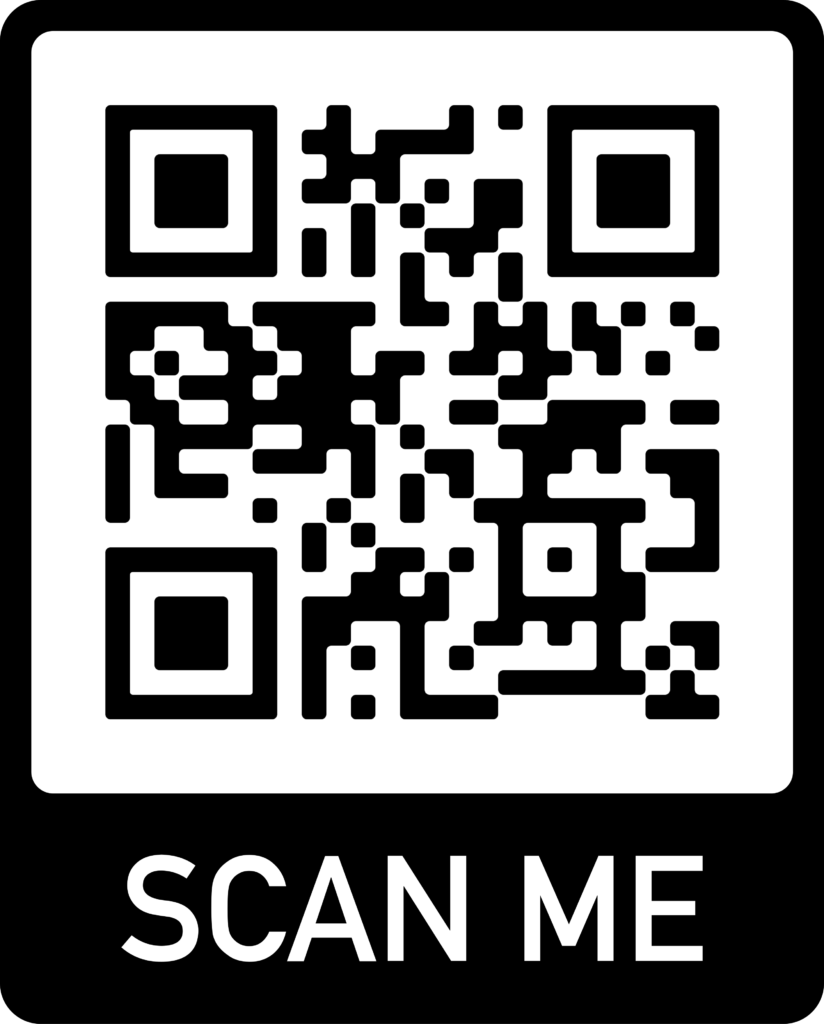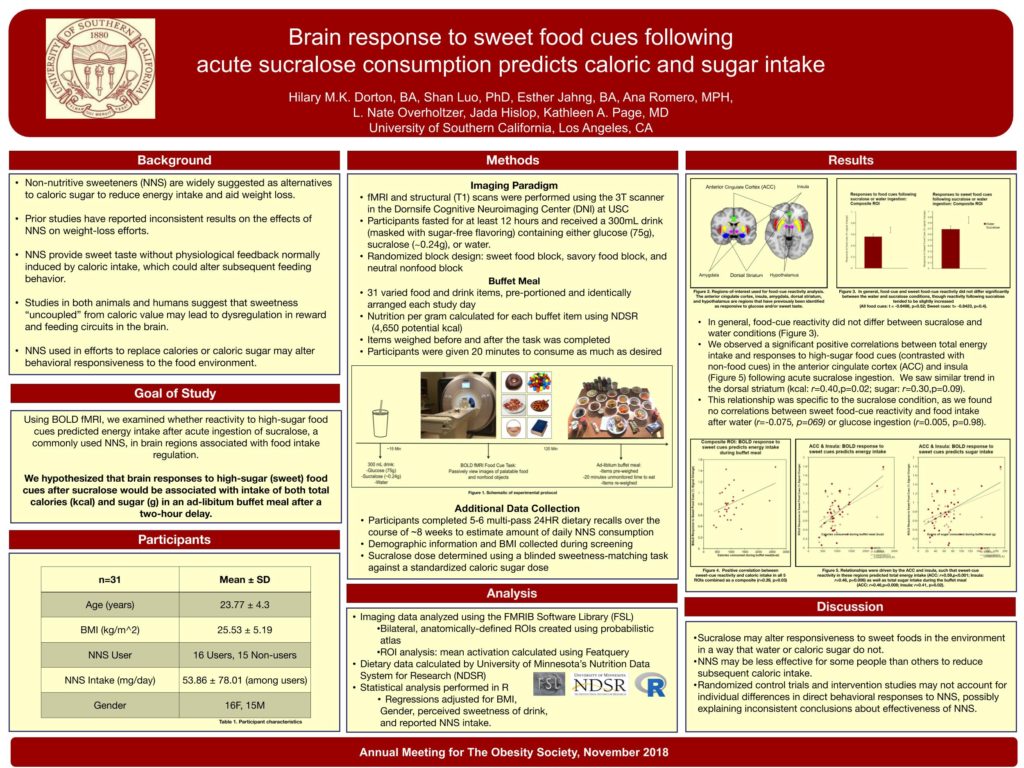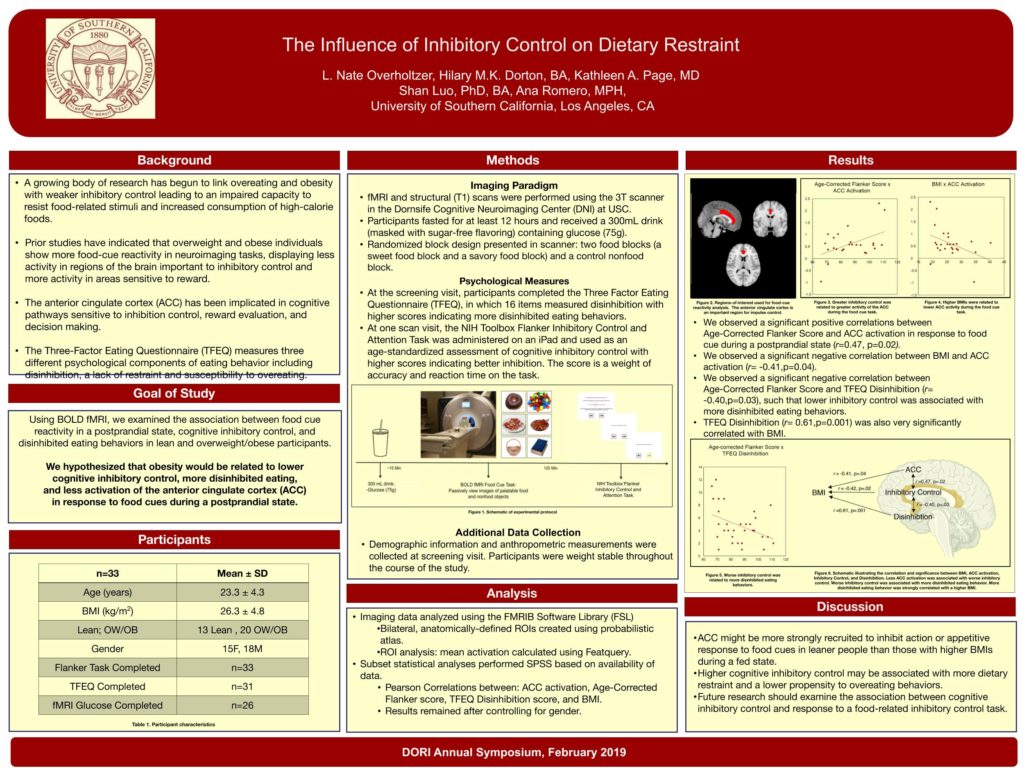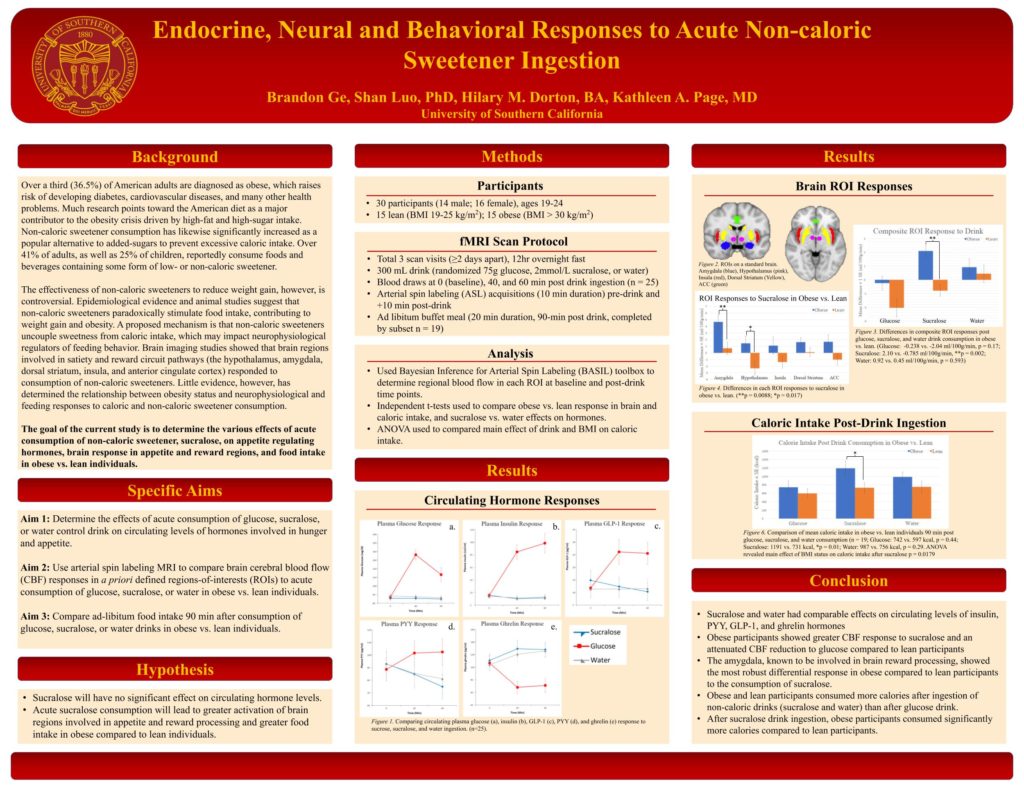
Sponsors
- National Institutes of Health
- The Doris Duke Foundation
- American Heart Association
Neural Mechanisms for Appetite Responses to High Reward Foods (RO1 DK102794)
Our Brain Response to Sugar study looks at how the brain responds to eating different types of sugars. We hope to learn how the brain responds to glucose and sucrose in young people and how this response may be different in people who are overweight and obese compared to people who are normal weight.
Glucose is a simple sugar found in many commercially available drinks, like juices and soft drinks. Glucose is rarely consumed by itself, therefore, we also evaluate the effects of table sugar (sucrose) and artificial sweetener (sucralose). This study may help us understand how specific sugars may cause us to eat too much and gain weight.
The Brain Response to Sugar Study is a registered clinical trial. To learn more, please visit our clinicaltrials.gov study page or contact us at pagelab@usc.edu.
Participate in this Study
You may be eligible to participate if you are:
- Between the ages of 18-35
- Have no history of diabetes
- Right Handed
- Have no non-removable metal (e.g. retainer) in body that would conflict with an MRI
The BRS-2 study will involve the following:
- A screening history & physical exam
- Up to 4 study sessions which include drinking a sweet beverage, answering questionnaires, blood sampling, and fMRI scans
You WILL be compensated for your time.
Related studies
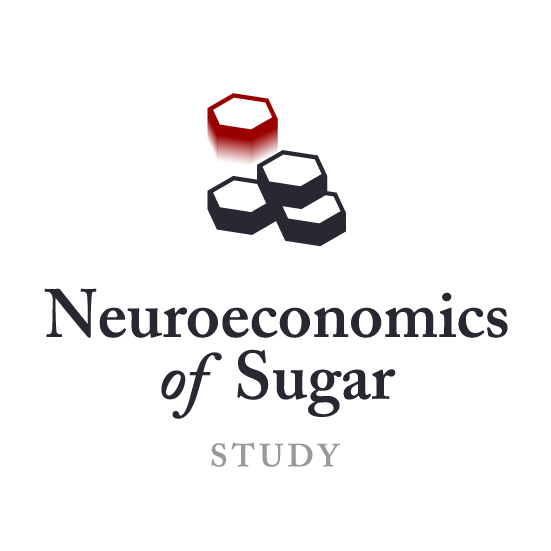
Neuroeconomics of sugars (R21 DA042272)
This project uses brain imaging and behavioral assessments to examine acute metabolic effects of glucose and sucralose (relative to water) on subsequent reward signaling and intertemporal decision making. This is done both in the context of monetary rewards (using the Monetary Incentive Delay Task and the Intertemporal Monetary Choice Task) and in the context of food rewards (using the Food Bidding Task). Because participants in this study are drawn from the pool that completed the ‘Brain Response to Sugar’ study, endocrine response derived in that study can be related to reward signaling and decision-making effects observed here.
featured presentations
Brain response to sweet food cues following acute sucralose consumption predicts caloric and sugar intake
- Sucralose may alter responsiveness to sweet foods in the environment in a way that water or caloric sugar do not.
- NNS may be less effective for some people than others to reduce subsequent caloric intake.
- Randomized control trials and intervention studies may not account for individual differences in direct behavioral responses to NNS, possibly explaining inconsistent conclusions about effectiveness of NNS.
The Influence of Inhibitory Control on Dietary Restraint
- ACC might be more strongly recruited to inhibit action or appetitive response to food cues in leaner people than those with higher BMIs during a fed state.
- Higher cognitive inhibitory control may be associated with more dietary restraint and a lower propensity to overeating behaviors.
- Future research should examine the association between cognitive inhibitory control and response to a food-related inhibitory control task.
Endocrine, Neural and Behavioral Responses to Acute Non-caloric Sweetener Ingestion
- Sucralose and water had comparable effects on circulating levels of insulin, PYY, GLP-1, and ghrelin hormones.
- Obese participants showed greater CBF response to sucralose and an attenuated CBF reduction to glucose compared to lean participants.
- The amygdala, known to be involved in brain reward processing, showed the most robust differential response in obese compared to lean participants to the consumption of sucralose.
- Obese and lean participants consumed more calories after ingestion of non-caloric drinks (sucralose and water) than after glucose drink.
- After sucralose drink ingestion, obese participants consumed significantly more calories compared to lean participants.
Non-caloric sweetener effects on brain appetite regulation in individuals across varying body weights
Most stories included the following key messages:
- Consuming sucralose increases activity in the hypothalamus, a brain region that regulates appetite and body weight, and the activation is linked to greater hunger. Sucralose also changes how the hypothalamus communicates with other brain regions, including those involved in motivation.
- Unlike sugar, sucralose did not increase blood levels of certain hormones that create a feeling of fullness.
- The effect of increased hunger and activity in the hypothalamus was stronger in in people with obesity
- Researchers tested how 75 participants responded after consuming water, a drink sweetened with sucralose, or a drink sweetened with regular sugar. They collected functional magnetic resonance imaging (fMRI) brain scans, blood samples and hunger ratings before and after participants consumed the drink.
- The findings show how sucralose confuses the brain by providing a sweet taste without the expected caloric energy, a “mismatch” that could even trigger changes in cravings and eating behavior down the line.
Media highlights include:
- CNN, which was picked up by Yahoo News, Yahoo Life, Aol, and more than 50 local media outlets across the country including WDSU TV (New Orleans), WBAL TV (Baltimore), WCVB-TV (Boston), KCRA TV (Sacramento), KEYT TV (Santa Barbara), Cincinnati), WESH TV (Orlando), KCCI TV (Des Moines) and KVIA TV (El Paso)
- Newsweek which was picked up by 24 local media outlets across the country, including The Kansas City Star, Miami Herald, The Sacramento Bee, The Fresno Bee, The Modesto Bee, The Charlotte Observer, (NC) and the Fort Worth Star
- HealthDay which was picked up by US News & World Report, Drugs.com, MedicineNet and more than 100 local media outlets across the country, including Northeast Mississippi Journal, The Selma Sun (Alabama), Citizen Tribune (Tennessee) and the Voice of Alexandria (Virginia)
- HealthDay TV
- New York Post which was picked up by Yahoo Life
- Fox News
- Fortune which was picked up by Yahoo Life, Yahoo Life UK, Aol and Inkl (Australia)
- Scripps News which was picked up by Aol
- Aol
- Parade Magazine which was picked up by Yahoo Life
- KABC-TV which was picked up by the US Times Mirror
- KNX Radio
- Science Alert which was picked up by Yahoo News
- Medical News Today
- Verywell Health
- Medscape
- Everyday Health
- New Scientist
- LabRoots
- Bioengineering
- Vice
- Daily Mail (UK)
- The Independent (UK) which was picked up by Yahoo News UK, Yahoo News Canada, Aol, Aol UK and Inkl (Australia)
- Daily Express (UK)
- GB News (UK)
- Technology Networks (UK)
- Bariatric News (UK)
- Confectionary News (France)
- The Times of India
- Geo News (Pakistan)
- Radio Zet (Poland)
The following outlets ran our press release:
- SciTechDaily
- News Medical (UK)
- Medical Xpress (UK)
- Knowridge Science Report (Australia)
The study was also posted on KSOM’s news page and on EurekAlert.org.

